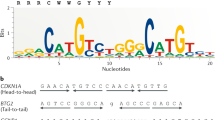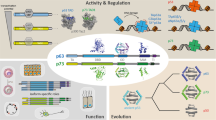Abstract
The growth suppressive properties of the tumor suppressor protein p53 are activated upon DNA damage. The activation of p53 is reflected in increased p53 levels which are, at least in part, the result of an extended half-life of the protein. Although this suggests that stabilization of p53 is an intrinsic feature of p53 activation, the mechanisms involved in p53 degradation and stabilization are poorly understood. Here we report on the identification of an internal deletion mutant of wild-type p53, termed Δ62–96, which can be stably expressed in various cell lines. This deletion mutant has a turnover rate similar to wild-type p53 and its stability is upregulated by treatment with UV light. In cell lines that express endogenous mutant or no p53, however, Δ62–96 appears to be stable, strongly indicating that these cell lines have lost the ability to degrade p53. Further characterization of Δ62–96 by mutational analyses defines sequence and structural requirements for p53 degradation and indicates that none of the known p53 phosphorylation sites is essential with respect to p53 stability regulation upon UV-irradiation.
Similar content being viewed by others
Author information
Authors and Affiliations
Rights and permissions
About this article
Cite this article
Hengstermann, A., Whitaker, N., Zimmer, D. et al. Characterization of sequence elements involved in p53 stability regulation reveals cell type dependence for p53 degradation. Oncogene 17, 2933–2941 (1998). https://doi.org/10.1038/sj.onc.1202282
Received:
Revised:
Accepted:
Published:
Issue Date:
DOI: https://doi.org/10.1038/sj.onc.1202282
- Springer Nature Limited
Keywords
This article is cited by
-
Serine 312 phosphorylation is dispensable for wild-type p53 functions in vivo
Cell Death & Differentiation (2011)
-
Nitric oxide induces phosphorylation of p53 and impairs nuclear export
Oncogene (2003)
-
Restoration of p53 expression sensitizes human papillomavirus type 16 immortalized human keratinocytes to CD95-mediated apoptosis
Oncogene (2002)
-
Dial 9-1-1 for p53: Mechanisms of p53 Activation by Cellular Stress
Neoplasia (2000)




